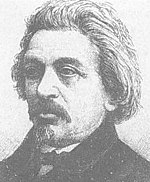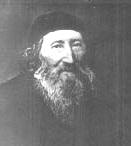Proto-Zionism

Proto-Zionism (or Forerunner of Zionism; Hebrew: מְבַשְרֵי הציונות, pronounced: Mevasrei ha-Tzionut) is a term attributed to the ideas of a group of men deeply affected by the idea of modern nationalism spread in Europe in the 19th century as they sought to establish a Jewish homeland in the Land of Israel. The central activity of these men was between the years 1860 to 1874, before the Zionist movement established practical (1881) and political Zionism (1896). It is for this reason that they are called precursors of Zionism, or proto-Zionists.
But while the 17th century raised the overall idea of "restoring the Jews to Israel naturally by settlement and political action" [1] by Jews and non-Jews, ideas therein in terms of an ultimate goal were missing. These ideas also did not unite people to action and relied on the national project and the State (the Jewish nation). Therefore, the figures behind these ideas are not considered as Heralds of Zionism.
This group of men considered as proto-Zionists includes Rabbi Judah Bibas (1789-1852), Rabbi Judah ben Solomon Hai Alkalai (1798–1878), Rabbi Zvi Hirsch Kalischer (1795–1874), and philosopher Moses Hess (1812–1875).
History[]
This section does not cite any sources. (March 2016) |
The medieval Jewish Torah scholar Maimonides advocated a re-establishment of Jewish sovereignty in the Land of Israel in a lengthy preface to his 13 principles of faith. He wrote that Jewish national independence would come about through natural means and argued for political activism to bring it about.[2]
According to Ben-Zion Dinur, the aliyah of Judah HeHasid and his group opened a new era which began to develop processes such as encouraging productivity, the revival of the Hebrew language and national aspirations. Nahum Sokolow described proto-Zionists as anyone who wished to renew the Jewish community in the Land of Israel, or who wrote about the Jewish problem, starting from the 17th century. This broad definition included such figures as Moses Montefiore, Adolphe Crémieux, Eliezer Ben-Yehuda and Sabbatai Zevi. Nathan Michael Gerber also traced the forerunners of Zionism back to the 17th century.
According to Arie Morgenstern,[3] the Vilna Gaon of Lithuania, Elijah ben Solomon Zalman (1720-1797), promoted a teaching from the Zohar (book of Jewish mysticism) citing the prediction that “the gates of wisdom above and the founts of wisdom below will open” "after six hundred years of the sixth millennium" i.e. after the year 5600 of the Jewish calendar (1839-1840 AD). Many understood this to imply the coming of the Messiah at that time. This early wave of Jewish migration to the Holy Land began in 1808 and became dominant until 1840.[4] Although the Messiah did not appear, the Ottoman government took control of Palestine from the Egyptians in 1840, and its recently-established rights for all Ottoman citizens--regardless of religion--was thus extended to the non-Muslim populations of Palestine, including the Jewish people there. The right to purchase and own land was a particularly significant, if less noticed, milepost in the return of the Jewish people to the Holy Land.
According to Dov Weinereve,[dubious ] the first "forerunner" is Mordecai Manuel Noah.[citation needed]
Jacob Katz argued that it is possible to point out only on three men as "forerunners of Zionism": Rabbi Judah ben Solomon Hai Alkalai, Rabbi Zvi Hirsch Kalischer, a thinker Moses Hess, since although other people acted in various forms, it is just these three's actions that left the imprint on the Hovevei Zion. Samuel Leib Zitron cited Rabbi Alkalai as the pioneer of modern political Zionism.
Citron and , who argued that even if preceded by the movement of Hovevei Zion were different personalities who tackled the Jewish problem, the few acts that they were at hand to do did not leave an impression for generations, did not affect anything on the Zionist movement, and thus there is no person that could be called "harbinger of Zionism".
Zionism's precursors[]
- The Vilna Gaon (1720-1797) was one of the chief promoters of the idea that the passage from the Zohar mentioned above indicated that the Messiah would return in 1840. Groups of his followers ("Perushim") started to arrive in the Holy Land in 1808. [5]
- Judah Bibas was a Gibraltar-born Rabbi, who served as the Chief Rabbi of Corfu. Bibas visited Jewish Communities all over Europe, and he encouraged Jews to make Aliyah to Palestine.
- Moses Hess was influenced by the idea of modern nationalism and in 1862 he published his Rome and Jerusalem. Hess, who was secular and a former revolutionary socialist, rediscovered the cultural and political origins of Judaism, all in order to draw out ideas for the modern Jewish national movement.
- Yehuda Alkalai was a Spanish rabbi from the Balkans and a student of Rabbi Yehuda Bibas who was infused with Christian ideas about the end of redemption and deeply influenced by the political success of Adolphe Crémieux and Moses Montefiore and the Damascus affair, in 1840.
- Zvi Hirsch Kalischer was a German of Polish origin who believed that the emancipation - the granting of equal rights to Jews, at least practically, was part of the process of redemption.
Katz argues that the rabbis Alkalai and Kalisher changed their religious worldview, abandoning the "Basics of non - realistic perception of traditional Messianic views".[6]
He also explains that during their actions as forerunners of Zionism there "was not on the agenda an issue of lack of rights to Jews or social discrimination" [6] and thus the modern idea of Jewish nationalism was not a success in the years they operated. From the late '70s, with growing economic plight of Eastern European Jews and the rising wave of anti-Semitism, two and a half million Jews left Eastern Europe (until World War I), while only a small percentage of them emigrated to Israel.
See also[]
References[]
- ^ Jacob Katz, "Jewish nationality", Hasifriya ha-Tzionit, Jerusalem, 1983
- ^ Maimonides and Medinat Yisrael
- ^ Hastening Redemption--Messianism and the Resettlement of the Land of Israel, Oxford University Press, 2006
- ^ ibid, pgs 24-25
- ^ Hastening Redemption by Arie Morgenstern, pg 24-25
- ^ Jump up to: a b Jacob Katz, "התנועה היהודית הלאומית: ניתוח סוציולוגי", Jerusalem, 1980
- Forerunners of Zionism
- Zionism
- Political theories

